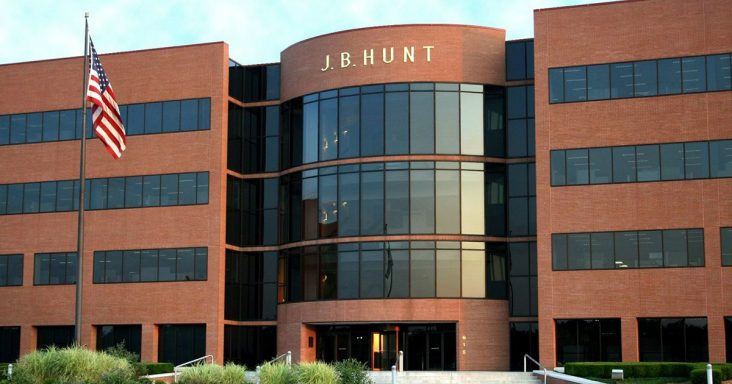J.B. Hunt revenue, earnings to fall in third quarter, analysts say
by October 8, 2020 5:58 pm 1,043 views

Lowell-based carrier J.B. Hunt Transport Services Inc. is projected to report declines in revenue and net income in the third quarter.
Before the markets open Oct. 16, J.B. Hunt is expected to post third-quarter earnings of $1.24 per share, down from $1.40 per share in the same period in 2019, based on a consensus of 21 analysts. Revenue is projected to decline by 1.8% to $2.32 billion, from $2.36 billion.
Through the first half of the year, net income has fallen 10.5% to $225.53 million, and revenue has risen 1.7% to $4.42 billion.
In a third-quarter earnings preview, analysts Justin Long and Jack Atkins and associates George Sellers and Wade Schaller, all of Little Rock-based Stephens Inc., said they expect J.B. Hunt’s financial results to beat expectations, but “there are likely to be a lot of moving pieces.”
Intermodal demand is beating expectations, dedicated sales activity has started to accelerate again and improvements are expected in truckload and final mile segments, they said. Headwinds include higher driver-related costs, congestion at West Coast ports and an operating loss in the carrier’s brokerage segment that might be worse than the previous quarter.
The brokerage segment, Integrated Capacity Solutions, had an operating loss of $13.1 million in the second quarter, compared to a $600,000 loss in the same period in 2019. Revenue fell 9% to $304 million.
The analysts said they believe J.B. Hunt “is focused on managing the business for the long term. And we think the stage is set for this strategy to combine with the benefits of the recent cyclical inflection in the freight market (boosting pricing power) to drive meaningful (earnings per share) upside vs. the street in 2021 and 2022.”
Earnings per share are expected to rise by about 30% in 2021 and about 20% in 2022, the analysts said. They maintained an overweight (buy) rating and increased the 12-month target price to $155, from $144.
Following are analyst comments by segment:
INTERMODAL
Intermodal demand rose in the third quarter along with the improvement in the truckload segment. Some challenges have included West Coast port congestion largely in the first half of the quarter and customers retaining intermodal containers. These issues have limited the carrier’s growth capacity, and intermodal volumes are expected to rise by 2.5% in the third quarter, from the same period in 2019. If more capacity were available, existing demand could support a double-digit volume increase.
“This should bode well for the pricing dynamics in the quarters ahead,” the analysts said. “And on this point, we estimate (about) 20% of the intermodal business could re-price in (the fourth quarter of 2020). From a margin perspective, we believe the operating leverage associated with intermodal revenue improving sequentially can help offset the aforementioned operational challenges/costs.”
Intermodal operating margins are expected to rise 0.3 percentage points to 10.3% in the third quarter, from the previous quarter.
DEDICATED CONTRACT SERVICES
As the freight market improved, dedicated sales activity rose. This is expected to lead to strong growth in the dedicated fleet in 2021. The Stephens analysts expect 700 trucks to be added to the fleet in 2021 and 800 in 2022. Fleet growth is expected to be flat in the second half of 2020.
Margins are expected to remain more than 11% to 13% over the long-term.
BROKERAGE
Gross margins were expected to improve over the third quarter but are expected to be down 3.3 percentage points to 8.5% in the quarter, from the previous period. Operating loss is projected to be about $20 million.
“That said, as contractual business is re-priced, we think the stage is set for margins to continue improving sequentially in the quarters ahead,” the analysts said. “More importantly, we think management remains focused on its longer-term objectives of increasing scale in its (J.B. Hunt) 360 platform, achieving profitability in this segment by (the second half of 2021) and being one of the leaders in the digital brokerage movement. And in our opinion, the company will be opportunistic/strategic leveraging the current dislocation in the freight market to achieve these targets.”
The earnings preview also highlighted that Uber Freight received $500 million from private equity investors led by Greenbriar Equity. The investment announcement shows that Uber Freight looks to become a leader in digital brokerage, the analysts said. This could be viewed as negative for J.B. Hunt 360, but they expect “more than one winner in the digital brokerage market.” And J.B. Hunt is expected to be “one of the winners given its history in the freight sector across various modes.”
The investment placed a $3.3 billion value on Uber Freight, and the analysts noted the company’s revenue was $211 million in the second quarter. This compares to the $229 million in second-quarter revenue booked through the J.B. Hunt 360 platform.
The analysts used Uber Freight’s investment value to determine the stock value of J.B. Hunt’s brokerage segment and the overall value of the carrier. Based on the Uber Freight’s value, J.B. Hunt’s brokerage segment is worth about $30 per share, and the remainder of J.B. Hunt is worth about $150 per share. Combined, this would imply J.B. Hunt is worth $180 per share, and the analysts believe this is achievable if J.B. Hunt 360 is successful.
Shares of J.B. Hunt (NASDAQ: JBHT) closed Thursday (Oct. 8) at $135.30, up $2.73, or 2.06%. In the past 52 weeks, the stock has ranged between $144.35 and $75.29.
